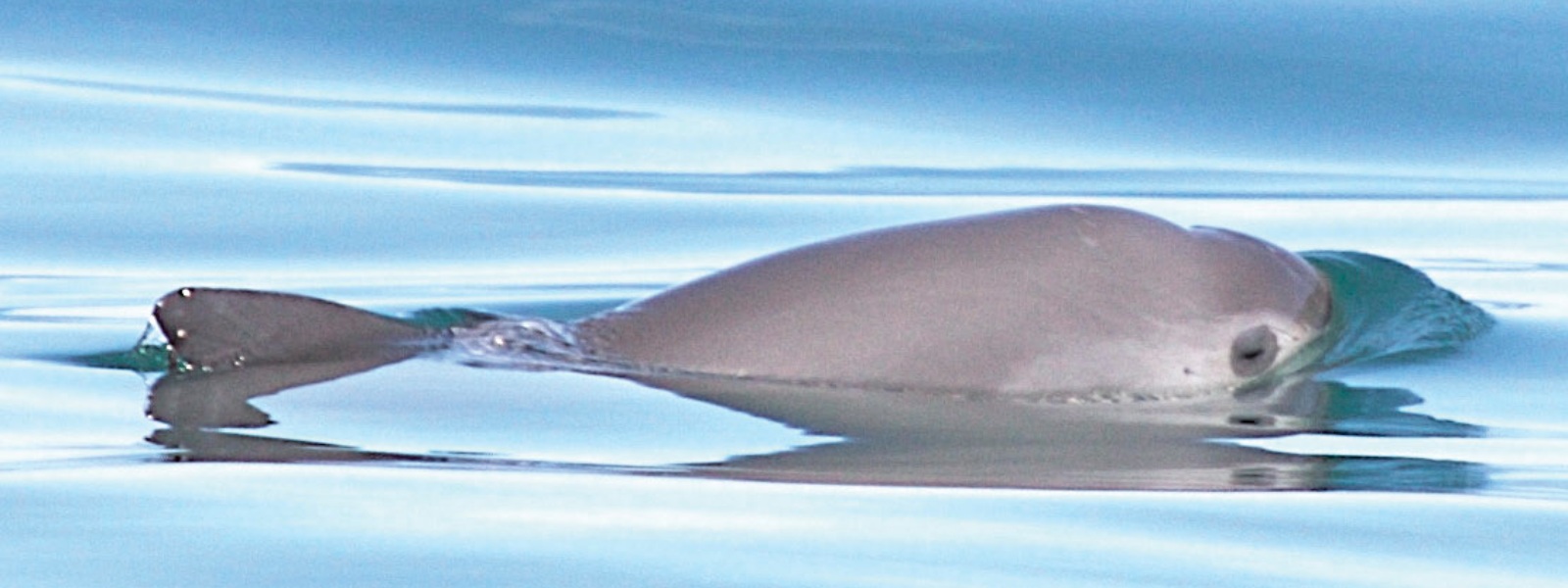

The Earth Island’s International Marine Mammal Project (IMMP) has joined more than 50 environmental organizations in a boycott against the Mexican shrimp industry. This boycott is a last-ditch effort to save the world’s most critically endangered cetacean, the vaquita porpoise, from extinction.
Confined solely to the upper, northwestern section of the Gulf of California, the world’s last 30 vaquitas struggle to survive against the daily threats that illegal shrimp and totoaba fishing pose to their dwindling population. Within the last three years, the number of vaquitas has been cut in half due to drowning in nets. Without urgent action to protect vaquitas, they face extinction within the next few years.
Much of the vaquitas’ decline is attributed to gillnets – flat, vertical nets that entangle fish by their gills, drowning vaquitas in the process. Made with monofilament plastic lines, the nets are invisible to the vaquitas’ sonar. In 2015, Mexico attempted to protect the vaquita population by imposing a two-year ban on gillnet use within vaquita habitat.
Though Mexico can be commended for its conservation attempts, the law proved unsuccessful in the long run. Ultimately, loopholes in policy (such as a lack of adequate law enforcement mechanisms) have made it relatively enticing for fishermen to disregard its provisions and engage in illegal totoaba and shrimp fishing. Additionally, the law is fleeting: it was only designed to extend through April of 2017. Though the Mexican government recently extended it for one more month, until May 2017, future environmental policy is up in the air.
Recognizing the lack of broad-based conservation strategy, the Ministry of Environmental and Natural Resources in Mexico has recently committed to a $3 million dollar plan for a temporary vaquita sanctuary. But this is not enough. As an emergency strategy, this does not provide the long-term protections that the world’s vaquita population needs to survive.
For these reasons, the Boycott Mexican Shrimp campaign provides a threefold action plan to counter threats posed to vaquita and ensure the safety and security of this beautiful species: crackdown on the root of the problem, enforce environmental protections, and engage in grassroots activism.
First, the demand for Mexican shrimp – sold in markets around the world – and totoabas – poached for their highly prized bladders popular in China – need to be limited. With less economic incentive for fishermen to venture into vaquita habitat, fewer fishermen will threaten the health of vaquitas. The economic impact of the boycott will help encourage the Mexican government towards better enforcement.
Next, stronger vaquita conservation policies need to be implemented in Mexico. The two year gillnet ban, though a step in the right direction, has not been enough. Stronger law enforcement mechanisms and marine security should be deployed in greater numbers to watch, observe, and record the actions of the fishermen in vaquita habitat to crack down on illegal fishing. Although the Environmental Police – and nonprofit groups such as Sea Shepherd Conservation Society – play an important role in patrolling the sea, the Mexican government needs to work with multi-agency law enforcement to impose harsher penalties on illegal fishing. Additionally, the Mexican government needs to be willing to commit to a long-term sustainability plan for the porpoises and the fishermen.
Finally, grassroots activists need reach out and demand action. Go to www.BoycottMexicanShrimp.com to find out more about the Boycott Mexican Shrimp campaign, and to find links where you can write to Gerónimo Gutiérrez -- Mexico's ambassador to the United States – to express your concern for the vaquitas’ plight.
Grassroots activism is especially critical, now that Donald Trump’s Administration controls United States policy. During the Obama Presidency, President Obama and Mexican President Enrique Pena Nieto engaged in bilateral, cooperative discussions around vaquita protection and wildlife conservation in the Gulf of California. But, there is no guarantee that the Trump Administration will continue to push for meaningful environmental reform projects with Mexico.
It is imperative that activists from around the world stand up against the destructive Mexican shrimp and totoaba industries in order to save vaquitas from extinction. This issue is urgent: vaquitas will go extinct without those willing to stand up and fight for them.
Go to www.BoycottMexicanShrimp.com and take action!
Photo credit Tom Jefferson.